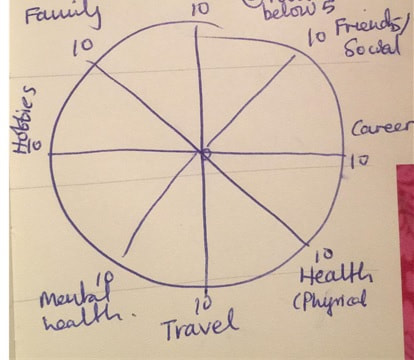|
7/3/2019 0 Comments FREAK OUTverb (adverb), informal To be in a heightened emotional state, such as that of fear or excitement. What I learnt recently, is that even those who seem (and probably) are very emotionally strong, have moments, days, weeks or even longer periods of freaking out. It’s in our nature to have a variety of good and bad emotions that come in and out of our minds, sometimes triggered by external factors (e.g. weather, changes in situations, other people’s behaviour, (un)fortunate events or things that happened too quickly for us to process), and other times internal factors (e.g. our mental or physical health, being tired, stressed from work or life). For instance, people can freak out at their own weddings, even if they know deep down that they are marrying the right person, everything is organised and under control, everyone is happy. However somehow, on D-day, some people run away, don’t show up, or take a while before making it their way to the wedding… because they are freaking out. We’ve seen it in movies, but it’s apparently a thing. Recently, I had a number of good things happening to me (after a loooong time), and instead of basking in joy, I freaked out. A good friend of mine reminded me that everything I mentioned to them at the time was actually: good. I just happened to be overwhelmed by it all and had to process a mixture of excitement + fear of losing it all. Sometimes, it may also be the case that there are a mixture of types of emotions in your mind and the confusion and lack of control over understanding your own thoughts and being able to categorise them, results in… freaking out. In my opinion, I suggest building a visual or a framework to help you pin-point the main causes of your freak out. Here are some examples of how we can use two emotions to monitor our mind in such situations:
1. BUYING A PROPERTY Buying a new house = Excitement (of becoming a homeowner) + Fear (of affordability) + Lack of control (over all the organisation + paperwork) Analysis: majority of the freak out is due to a positive emotion, and acknowledging this could help you feel better. You also have a clearer view of where to focus your actions and efforts e.g. spend an hour over the weekend mapping out all the bills, service providers and budget for them to make yourself feel more in control of the situation going forward. Once you’ve done that, start enjoying the excitement of moving into a new home with all the fun of decorating it and making it your home. 2. new relationships Getting into a new relationship = Excitement (of finding potential love) + Fear (of being hurt, losing independence) Analysis: depending on how well you may have dealt with being hurt, or how good or bad your past relationships have been (if applicable), the value you put under that category for a new relationship could vary. The effect on laying out the factors behind you freaking out, could help with conversations with your new partner and can help them understand you and your actions better. 3. CHANGING JOBS Changing jobs = Excitement (of a hopefully better salary, change of scene, better responsibilities) + Fear (of leaving existing friends and colleagues, leaving your comfort zone, not knowing what to expect, failure) Analysis: we need to remember that in most cases, the main reason why you even considered moving jobs, is that there may be something(s) that is or aren’t quite right in your existing job. For instance you may be underpaid, overworked, underworked, lacking motivation, not feeling like you’re contributing, not being recognised, not having a great boss or team, or not fitting in, etc. If any of these are persistently in your mind over say, 12 months or more it may be a signal towards looking for a new job. However, it’s probably a bad idea to move to another job that is equally bad or worse, consciously, just for the sake of leaving your current job. Then comes the freak out on whether the new job is going to be good or not and worth making the move. My article on how to find out if you’re in the right job covers other more specific frameworks. But for the sake of this article, if your excitement level is reinforced by good signs from the new job, then you can make a more informed and calculated risk. 10 quick ways to stop freaking outThere are also times when we freak out, with no particular reason. Here are 10 quick ways to try to calm down in moments of freaking out or panic:
my secret life wheel If you've made it all the way through this article, I have a gift for you... I use this wheel to draw out where I think I am in my life at the moment, what areas may need some extra attention and hence be the reason behind a potential freak out. Instructions: Rate yourself in terms of how good you feel about where you are in 8 key areas of your life between 0 – 10, 10 being the best and 0 the worst. For example:
When you mark yourself out of 10 in each of these areas, you can quickly identify those where you need to focus your attention on in the near future i.e. anything that rates 0 – 6 on the scale. This is a visual way of diagnosing what’s happening in your life and mind, and what the root cause(s) of your freak outs may be. I hope you found this article helpful and if so, you may find the ones below worth a read too. Enjoy! SIMILAR ARTICLES...
0 Comments
Your comment will be posted after it is approved.
Leave a Reply. |
Home |
Categories |
|




 RSS Feed
RSS Feed